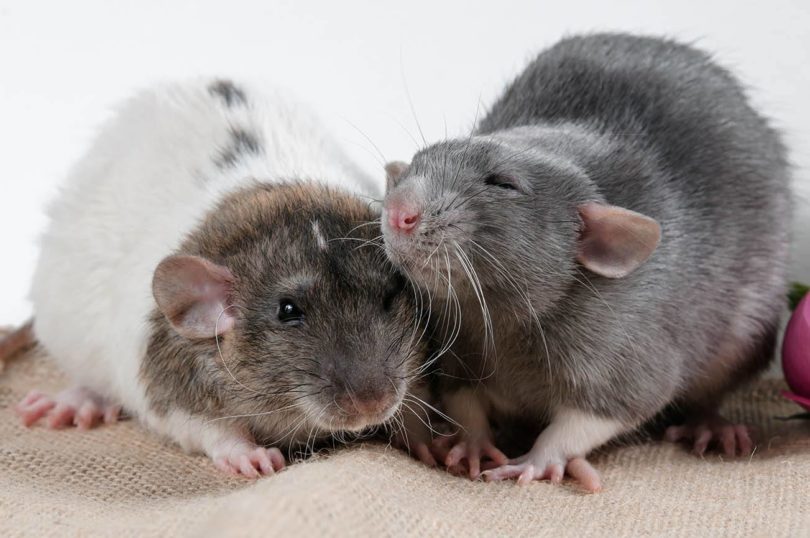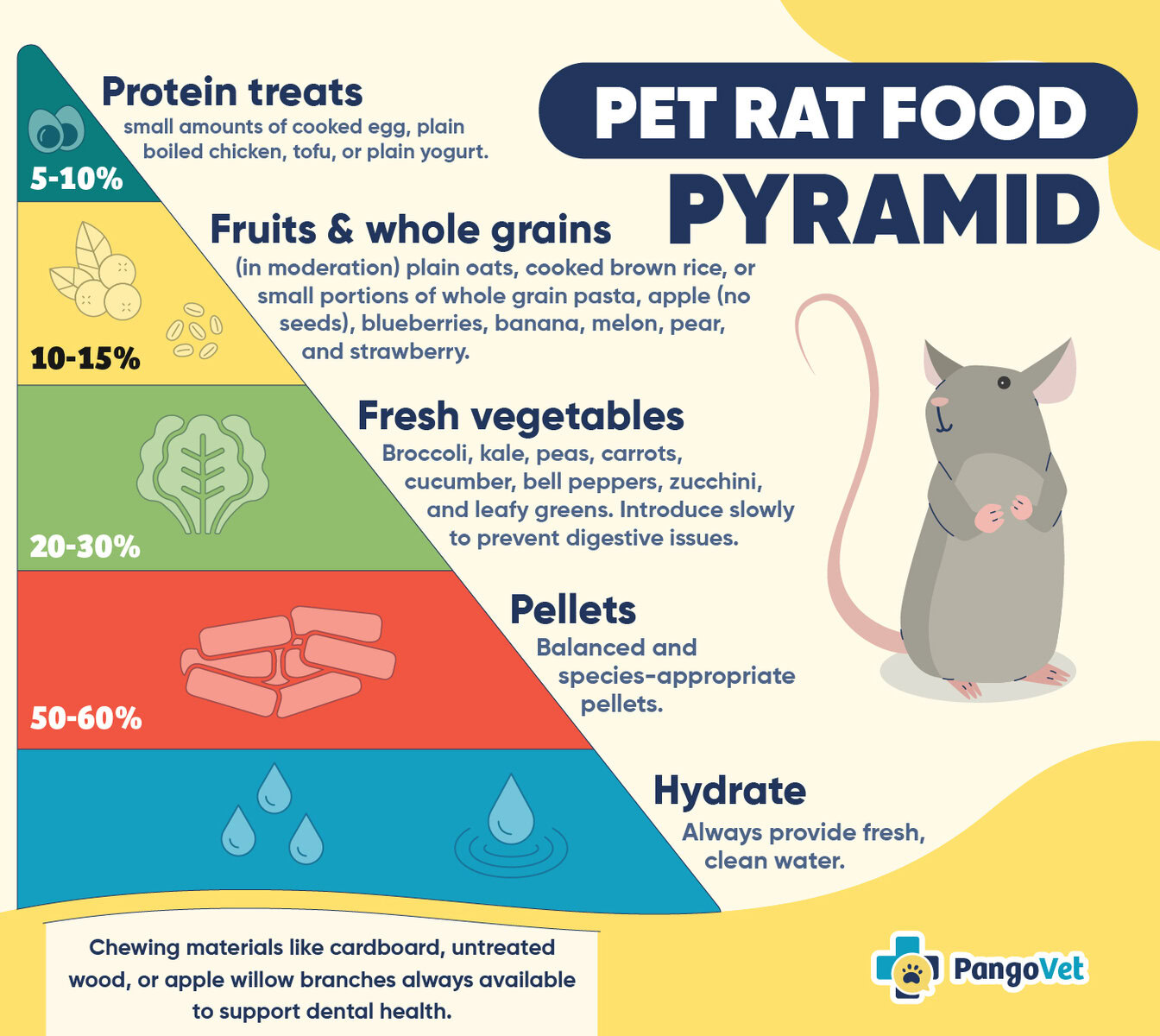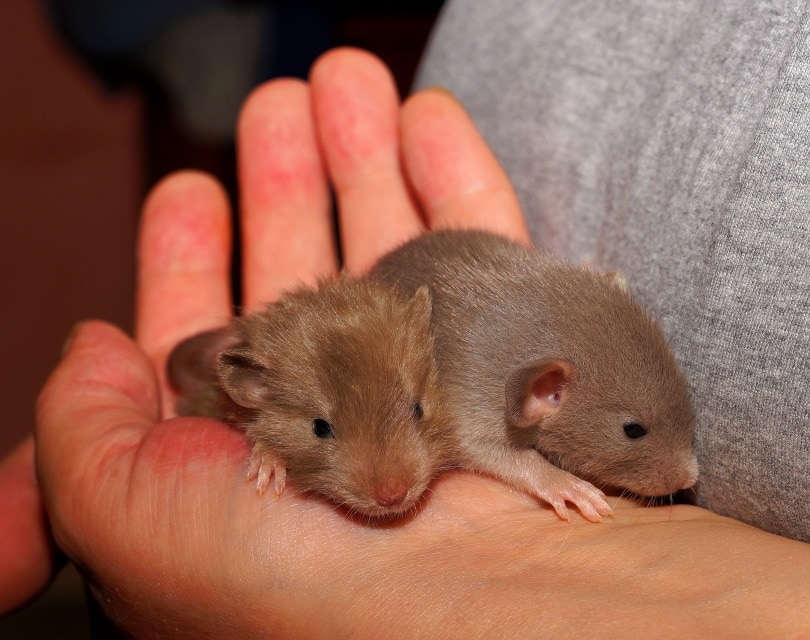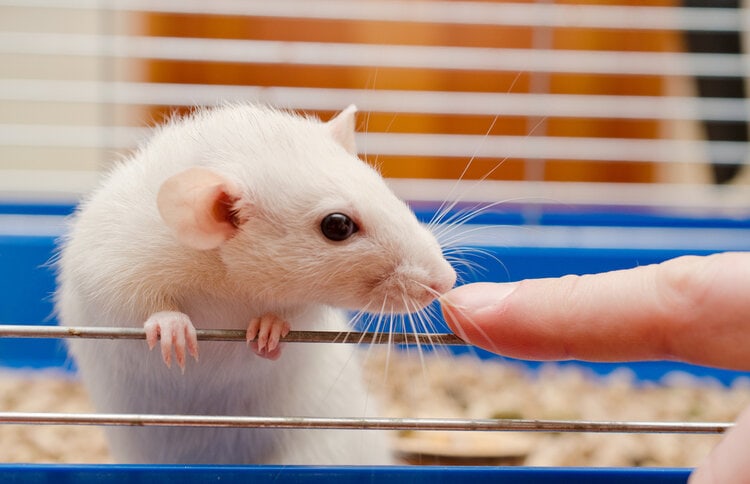Click to Skip Ahead
Surprisingly smart and friendly, rats make fantastic pets for people of any age. Playful little pals that love to cuddle, explore, and learn, rats are social creatures that thrive on human companionship. In order to properly care for your rat, you’ll need all of the right rat accessories, including a spacious cage, toys, bedding, and food.
If you’re thinking about adding this adorable critter to your household, here is everything you need to know about taking care of your pet rat.

Rat Facts
- Rats are clean pets
- With proper training and socialization, rats can be great companion animals
- Rats have huge incisors. Be careful where you put your fingers!
- A family of rats is called a swarm or pack
- Rats can give birth to up to 20 baby rats, called pups
- A rat was launched into space from France in 1961!
- The average pet rat lives for two years
- Rats can grow to be up to 11 inches long, with an additional 8-inch tail
Do Rats Make Good Pets?
Despite their reputation as dirty city vermin, rats actually make fantastic pets for both kids and adults. Rats are much cleaner than most people give them credit for and love to groom themselves and each other. Loyal and loving, rats will show affection to their beloved owners and cuddle up close to your chest. They can even sit on your shoulder and accompany you around the house!
Though rats don’t live very long, they will add fulfillment and joy to your life for as long as they’re around. If you own larger pets, such as a dog or a cat, you need to keep a close eye on your rodent so he doesn’t get injured by the larger animals. Additionally, rats do need preventive medical care to treat issues such as tumors, uterine infections, and respiratory conditions.
Where Can I Get a Pet Rat?
Many folks opt to buy a pet rat from their local pet store. However, you can also buy rats from specialty breeders and even adopt one from your neighborhood animal shelter. People who are on the hunt for a fancy rat will generally get these rodents from qualified rat breeders. Hairless, Dumbo, Satin, Tailless, and Bristle Coat rats can all be picked up from an exotic rat breeder.

How Much Does It Cost to Own a Pet Rat?
Expect to spend up to $400 to $500 annually for your pet rat. The initial cost of buying a rat will cost between $100 and $300 for items such as their cage, accessories, bedding, food, and toys. The rat itself will run you between $10 and $30.
- $100 to $300 on supplies, including a cage, travel carrier, food bowl, water bottle, bedding, toys, enclosed house, food, salt licks, and treats.
- $100 to $150 in annual healthcare costs, including parasite treatment, emergency vet visits, and insurance.
- $60 to $120 for rat food, including treats.
- $120 to $240 for environmental maintenance, such as organic bedding.
Though a pet rat will cost you up to $500, the love he’ll provide you with is priceless.

What Kind of Home Does My Pet Rat Need?
A large wire cage with horizontal bars is the best type of home for a pet rat. This way, your rodent pal can climb up and down the cage and get plenty of exercises. At a minimum, your rat’s cage should be two square feet, or 12 by 24 inches. However, it’s always better to choose a larger cage so your rat has plenty of room to move around.
Never get a cage with wire flooring as they can hurt your pet’s little paws. Cages with different levels will encourage your rat to create different “zones” in his cage. For example, he may use the floor as his feeding zone and the top level as his sleeping area.
Always keep your rat’s cage in a safe, quiet area of your home that is not accessible to other pets. Avoid placing the cage in direct sunlight or in drafty areas. Rats are most active at night, so don’t keep your rat in your bedroom if you want to sleep soundly.
What Should I Feed My Pet Rat?

Rats need constant access to fresh food and water. The best way to provide your rat with clean water is to attach a water bottle with a sipper tube to the side of his cage. Change the water daily and always ensure the water bottle is full.
Use a large, heavy ceramic food dish for your rat’s meals. These types of bowls won’t tip over and spill food all over the cage.
Block or pelleted rat food provides plenty of vitamins and minerals to your pet. Select a rat block that has a low fat and calorie content and is high in soy meal rather than corn. In addition to commercial rat food, give your pet plenty of fruits, nuts, and veggies. The occasional low-fat cooked meat or mealworm treat will ensure your rat is getting his proteins.
How Do I Take Care of My Pet Rat?

Rats are social creatures that require plenty of playtime and socialization. Don’t just leave your rat in his cage and forget about him. Allow him to climb on your hands and chest. You can also outfit his cage with cardboard tubes, ropes, toys, tunnels, platforms, and hammocks to keep him engaged while he’s in his house. Rotate or move the toys regularly to keep your rat challenged and to prevent boredom.
If you let your rat free roam inside of your home, always keep a close eye on him, and keep all other pets away. Don’t let your rat scoot under any furniture or chew on wires or walls.
When handling your pet rat, handle him gently, and don’t put your fingers near his mouth. He may bite! Never pick your rat up by his tail. Always supervise your children when they’re handling your rat.
While rats don’t need to be groomed (they do it themselves!) they do need their sharp nails trimmed every two months or so. Use a pair of human nail clippers and trim the nails as needed. Avoid trimming the pink portion of the nails. If you accidentally nip the quick and nick a blood vessel, apply a small dab of cornstarch to the tip of the nail to quickly stop any bleeding.
How Do I Know If My Pet Rat Is Sick?
The most common health conditions that affect pet rats are tumors and respiratory problems. If you see a large, unusual growth on your rat, it could be a tumor. Schedule a vet appointment to properly diagnose the treat the problem. If you notice that your rat is sneezing or sniffling, take him to the vet to get treated.
Rats can also develop bumblefoot, which is a painful condition that causes ulcers on the bottoms of their paws. If left untreated, this condition can be fatal.
Schedule bi-annual wellness checkups to ensure your rat is healthy.


Summary
Pet rats will make a great addition to any home. These loving, playful, and curious creatures need a lot of socialization and stimulation to stay happy and healthy. If you’re in the market for a petite pet, consider adding a rat to your home today!
Featured Image Credit: LankaP, Shutterstock











2 Responses
I could use some advice.
My cat caught a wild rat a while back and brought it into my room (alive) to show me. It thankfully managed to get free while she was distracted with all her showboating, but it didn’t exactly “escape”. It’s been living behind some storage bins in my room ever since, and that was like two weeks ago!!
The first night I felt so bad for the poor little cutie. I assumed they were just waiting for a good moment to make a run for it, so while they waited to feel safe enough I thought some food and water couldn’t hurt. I put out some dry cereal and an apple slice, and it poked its head of its hiding place (which was a reusable grocery bag tucked behind a shelf) and looked right at me. I instantly fell in love with her. (I’ll just say ‘her’, though I don’t know her gender, because that’s just the vibe I get.)
I’ve just kept on feeding her and giving her water since because I wasn’t sure if she was injured, or terrified, or what. I don’t know why she stuck around, but I want things to be as comfortable as possible for her in this bad situation.
I know there are a ton of major concerns about keeping a wild rat loose in my bedroom, but I didn’t exactly mean to. She’s been free to leave this whole time; my bedroom door is always open and there is an open window to outside through the adjoining room. It’s winter though of course, so escaping to outside might not be such an appealing option.
Morally speaking, I have no problem with her staying for the winter. I just worry about safety (for us both), and her happiness. I don’t know what to do in terms of:
Keeping her mentally occupied and offering her affection, as she is alone in here and doesn’t trust me enough yet to approach me
Keeping her safe from the cat when I’m not home (though luckily that’s very rarely; I’m on disability so I don’t work)
The whole… bathroom side of things. I found one place she seems to like to go that I can access to clean regularly, but I can’t get behind the bins where she is without moving a ton of shelving and everything those shelves hold. I don’t want the loud noises and shifting environment to cause her distress, either.
Potential destruction- I’ve offered her some flannel fabric cuts, paper towels, toilet paper rolls, and other various things for chewing on and for her nest, but I can’t see what’s going on back there. Where she comes out from to eat/drink there are some boxes of my things stored that I’d rather not have destroyed.
Potential mutual health concerns.
I know it’s nuts to even entertain this idea, keeping a wild animal like a pet, but I just don’t see another option where she survives. She’ll freeze outside. City animal control will most likely put her down. I don’t believe there is a rodent rescue in the city.
I simply refuse to allow her to come to harm on my watch. Any ideas on how to handle this?
Dear Atley,
thank you for sharing your story with us. As passionate animal lovers, we can relate with your struggle to get rid of the rat. However, there are some important considerations.
As you mentioned yourself, the rat is a wild animal. As such, there is an enormous risk of them being carriers of a disease that could be transferrable to humans, especially when the rat is moving freely around your room and leaving droppings.
It is only natural for them to not be compelled to leave your room since it is cold outside and you provide them with water and nutrition. This way you are creating a comfortable and warm place where the rat can spend the winter. In normal situation, rat would find themselves some warm and comfortable place anywhere else. You surely don’t need to worry that the rat would freeze to death. Vast majority of wild animals including bears, foxes, raccoons, hamsters, cats and rats are successfully surviving winter every year in some shelter.
Rats are natural survivors and omnivores, which means it is easy for them to find some food.
If we could give you a recommendation, try to capture the rat and release it somewhere outside in the area with possible shelters, which in case of a rat is basically anywhere in the nature or city. If you would be worried, you can provide them with some food they could eat or store in their new shelter. Unfortunately, the risk of getting sick from the rat is just too big.
Best of luck to you!